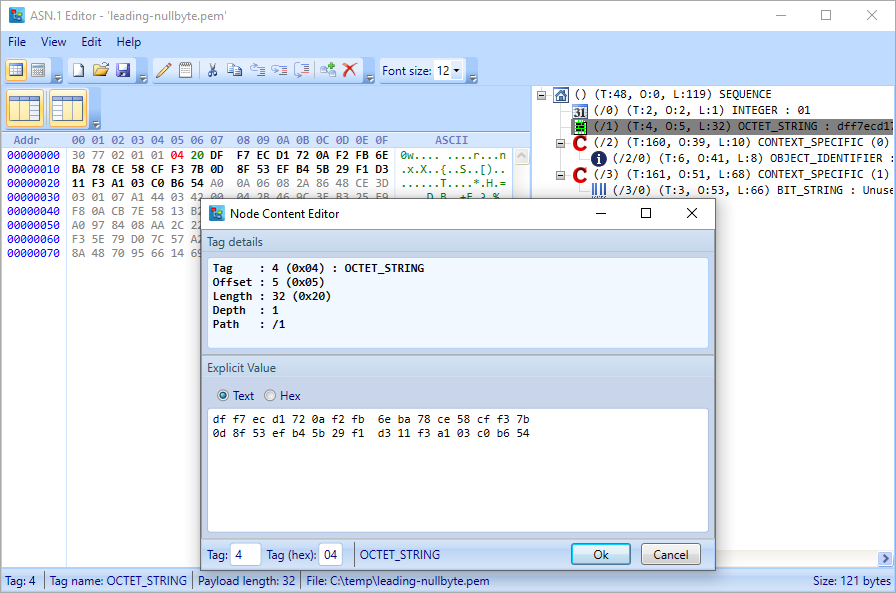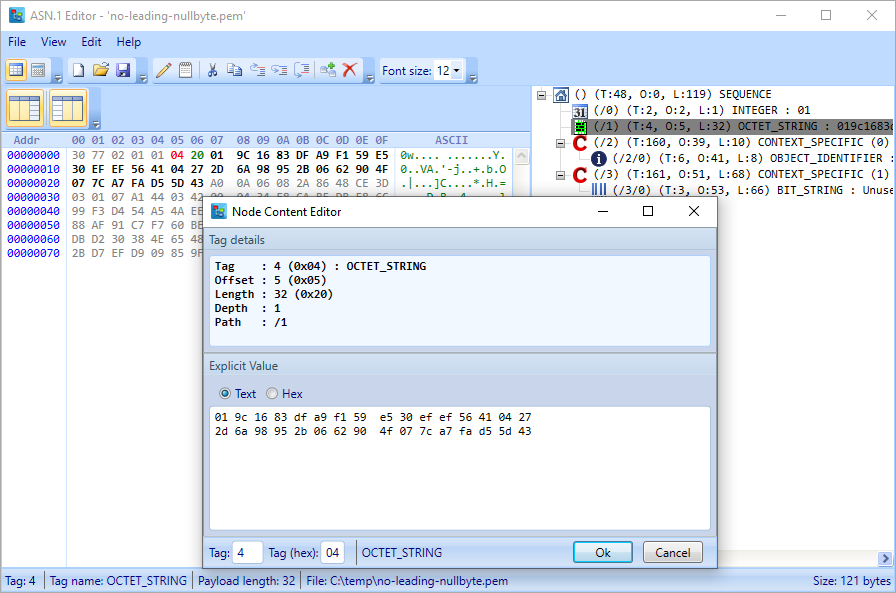I'm not sure why you want to cut off bytes. So I'm not sure if this is a good answer to your question here goes anyway.
Here's what I found out from reading the RFCs/experimenting.
How can I adjust the size of the private to 32 Bytes and public key to 64 Bytes?
You don't have to. They are already in that form. It's just a bit confusing to read from the openssl printout.
Does the leading 00 change the value of the number?
The answer is "No" if you were going to parse it as an unsigned int anyway. (And "yes" if you were (erroneously) going to parse it as a signed int. In that case you need to keep the 0x00 prefix.)
TLDR: The leading 0x00 is a SIGN BYTE that openssl adds for the printout only. It is NOT encoded in the certificate itself. And I guess you can cut of the leading byte (one of 0x02, 0x03 or 0x04) of the pubkey because it just stores info on whether compressed or noncompressed encoding is used.
Sample key with leading nullbyte
Here's an example of a random key I generated:
$ cat leading-nullbyte.pem
-----BEGIN EC PRIVATE KEY-----
MHcCAQEEIN/37NFyCvL7brp4zljP83sNj1PvtFsp8dMR86EDwLZUoAoGCCqGSM49
AwEHoUQDQgAEK0acP7Ml6fgKy35YE7JGVP7AmNy7oJ6gl4QIqiwiSExbr4iDPfxT
81550HxXoiQiBJXBJxhgXYpIcJVmFGk20w==
-----END EC PRIVATE KEY-----
ec printout leading-nullbyte.pem
This key is shown with the "00:" prefix for the private key.
At least when using the openssl pretty printer...
$ openssl ec -noout -text -in leading-nullbyte.pem
read EC key
Private-Key: (256 bit)
priv:
00:df:f7:ec:d1:72:0a:f2:fb:6e:ba:78:ce:58:cf:
f3:7b:0d:8f:53:ef:b4:5b:29:f1:d3:11:f3:a1:03:
c0:b6:54
pub:
04:2b:46:9c:3f:b3:25:e9:f8:0a:cb:7e:58:13:b2:
46:54:fe:c0:98:dc:bb:a0:9e:a0:97:84:08:aa:2c:
22:48:4c:5b:af:88:83:3d:fc:53:f3:5e:79:d0:7c:
57:a2:24:22:04:95:c1:27:18:60:5d:8a:48:70:95:
66:14:69:36:d3
ASN1 OID: prime256v1
NIST CURVE: P-256
asn1parse leading-nullbyte.pem
...however when actually looking inside the ASN1 encoding there is no 00: prefix. It just starts with df: right away. And also: length is given as 32 (l= 32). Not 33.
5:d=1 hl=2 l= 32 prim: OCTET STRING
0000 - df f7 ec d1 72 0a f2 fb-6e ba 78 ce 58 cf f3 7b ....r...n.x.X..{
Here's those lines in context:
$ openssl asn1parse -i -dump -in leading-nullbyte.pem
0:d=0 hl=2 l= 119 cons: SEQUENCE
2:d=1 hl=2 l= 1 prim: INTEGER :01
5:d=1 hl=2 l= 32 prim: OCTET STRING
0000 - df f7 ec d1 72 0a f2 fb-6e ba 78 ce 58 cf f3 7b ....r...n.x.X..{
0010 - 0d 8f 53 ef b4 5b 29 f1-d3 11 f3 a1 03 c0 b6 54 ..S..[)........T
39:d=1 hl=2 l= 10 cons: cont [ 0 ]
41:d=2 hl=2 l= 8 prim: OBJECT :prime256v1
51:d=1 hl=2 l= 68 cons: cont [ 1 ]
53:d=2 hl=2 l= 66 prim: BIT STRING
0000 - 00 04 2b 46 9c 3f b3 25-e9 f8 0a cb 7e 58 13 b2 ..+F.?.%....~X..
0010 - 46 54 fe c0 98 dc bb a0-9e a0 97 84 08 aa 2c 22 FT............,"
0020 - 48 4c 5b af 88 83 3d fc-53 f3 5e 79 d0 7c 57 a2 HL[...=.S.^y.|W.
0030 - 24 22 04 95 c1 27 18 60-5d 8a 48 70 95 66 14 69 $"...'.`].Hp.f.i
0040 - 36 d3 6.
So the leading 0x00 is not actually encoded in the certificate file. While I have not taken a look at the openssl source code in regards to that I'm leaning towards calling this a printout bug.
According to RFC5915 (I think) an EC key is an UNSIGNED integer.
ASN.1 Editor "leading-nullbyte.pem": no actual null byte
As an afterthought: Here's also an actual hexdump of the DER contents. And again: no actual 0x00 in the file.

Sample key WITHOUT leading nullbyte
Here's another random key I generated. It does NOT have the 0x00 prefix when using the openssl ec pretty printer.
So this tells me that that 0x00 prefix is not necessarily there for each EC privkey.
$ cat no-leading-nullbyte.pem
-----BEGIN EC PRIVATE KEY-----
MHcCAQEEIAGcFoPfqfFZ5TDv71ZBBCctapiVKwZikE8HfKf61V1DoAoGCCqGSM49
AwEHoUQDQgAENPjKv9vobJnz1FSlSu5cNPyPwCvcsMmIr5HH92C+mZdVtanHwlTm
29IwOE5lSE8KMywIJs8pLCvX79kJhZ/upg==
-----END EC PRIVATE KEY-----
ec printout no-leading-nullbyte.pem
$ openssl ec -noout -text -in no-leading-nullbyte.pem
read EC key
Private-Key: (256 bit)
priv:
01:9c:16:83:df:a9:f1:59:e5:30:ef:ef:56:41:04:
27:2d:6a:98:95:2b:06:62:90:4f:07:7c:a7:fa:d5:
5d:43
pub:
04:34:f8:ca:bf:db:e8:6c:99:f3:d4:54:a5:4a:ee:
5c:34:fc:8f:c0:2b:dc:b0:c9:88:af:91:c7:f7:60:
be:99:97:55:b5:a9:c7:c2:54:e6:db:d2:30:38:4e:
65:48:4f:0a:33:2c:08:26:cf:29:2c:2b:d7:ef:d9:
09:85:9f:ee:a6
ASN1 OID: prime256v1
NIST CURVE: P-256
asn1parse no-leading-nullbyte.pem
Here again length is given as 32:
5:d=1 hl=2 l= 32 prim: OCTET STRING
0000 - 01 9c 16 83 df a9 f1 59-e5 30 ef ef 56 41 04 27 .......Y.0..VA.'
Full parse:
$ openssl asn1parse -i -dump -in no-leading-nullbyte.pem
0:d=0 hl=2 l= 119 cons: SEQUENCE
2:d=1 hl=2 l= 1 prim: INTEGER :01
5:d=1 hl=2 l= 32 prim: OCTET STRING
0000 - 01 9c 16 83 df a9 f1 59-e5 30 ef ef 56 41 04 27 .......Y.0..VA.'
0010 - 2d 6a 98 95 2b 06 62 90-4f 07 7c a7 fa d5 5d 43 -j..+.b.O.|...]C
39:d=1 hl=2 l= 10 cons: cont [ 0 ]
41:d=2 hl=2 l= 8 prim: OBJECT :prime256v1
51:d=1 hl=2 l= 68 cons: cont [ 1 ]
53:d=2 hl=2 l= 66 prim: BIT STRING
0000 - 00 04 34 f8 ca bf db e8-6c 99 f3 d4 54 a5 4a ee ..4.....l...T.J.
0010 - 5c 34 fc 8f c0 2b dc b0-c9 88 af 91 c7 f7 60 be \4...+........`.
0020 - 99 97 55 b5 a9 c7 c2 54-e6 db d2 30 38 4e 65 48 ..U....T...08NeH
0030 - 4f 0a 33 2c 08 26 cf 29-2c 2b d7 ef d9 09 85 9f O.3,.&.),+......
0040 - ee a6 ..
ASN.1 Editor no-leading-nullbyte.pem

Extra: How do I know that the 0x00 is a sign byte?
... by experimentation:
I generated a thousand keys like so:
$ for i in $(seq -w 1000); do echo $i; openssl ecparam -name prime256v1 -genkey -noout > key.$i.pem; done
And then I sorted and counted them by first byte like so:
$ for i in $(seq -w 1000); do openssl ec -noout -text -in key.$i.pem 2>/dev/null | grep '^priv:' -A1 | tail -1; done | sed 's/ *//' | sed 's/\(..\).*/\1/' | sort | uniq -c
496 00
3 01
3 02
4 03
5 04
4 05
5 06
3 07
1 08
3 09
1 0a
3 0b
2 0c
2 0d
3 0e
4 0f
4 11
6 12
1 14
7 15
3 16
7 17
4 18
1 19
6 1a
3 1b
3 1c
3 1d
11 1e
3 1f
6 20
4 21
2 22
3 23
8 24
3 25
2 26
7 27
3 28
7 29
4 2a
4 2b
9 2c
2 2d
5 2e
2 2f
5 30
7 31
6 32
3 33
6 34
8 35
5 36
2 37
2 38
5 39
2 3a
1 3b
4 3c
3 3d
2 3e
2 3f
2 40
3 41
5 42
5 43
3 44
4 45
5 46
4 47
5 48
5 49
5 4a
5 4b
8 4c
6 4d
3 4e
5 4f
4 50
2 51
4 52
2 53
2 54
3 55
7 56
2 57
5 58
3 59
3 5a
5 5b
2 5d
1 5e
9 5f
3 60
3 61
3 62
6 63
3 64
1 65
7 66
4 67
3 68
4 69
4 6a
3 6b
6 6c
4 6d
3 6e
3 6f
7 70
4 71
2 72
5 73
2 74
1 75
5 76
3 77
10 78
2 79
7 7a
5 7b
6 7c
6 7d
5 7e
5 7f
The highest byte is 0x7f. And that is the final byte that still has a 0 as the most significant bit. (I won't post all thousand of them here but all the privkeys that had 0x00 as their first byte then had their second byte >= 0x80. (There were no privkeys that started with 0x0000.) And all the privkeys did NOT have 0x00 as their first byte then had their second byte <= 0x7f.)


